Today True Grace unveiled three foundational supplement lines, including probiotics, multivitamins and omega-3 fish oil. The new company is releasing new products rooted in a mission to transform traditional supplements by focusing on nutrient density and practices that regenerate the earth.
The offerings include probiotics, including one tailored to women, multivitamins for women, men, and women 40 and up as well as omega-3 fish oil.
Line up
True Grace’s probiotics feature 12 quantified and DNA-verified probiotic cultures to support digestive and immune health, prebiotic fiber to support beneficial bacteria, patented vegetarian DRcaps that allow probiotics to survive, as well as a patented CSP bottle that protects probiotics from moisture, light, and oxygen and also include 90 billion total CFU at time of manufacture.
When it comes to their multis, the company zeroes in on immune support with vitamins A, D3, and zinc, energy with coenzyme B, as well as adaptogens holy basil and ashwagandha as well as biotin and vitamin C for skin health. The Women’s iron-free Multivitamin 40+ contains vitamin K2 from MenaQ7 for bone support.
The High Potency Omega-3 Fish Oil – Brain, Heart & Immune Health formula contains 1400 mg of EPA and DHA in triglyceride form (4:3 ratio) from sustainably sourced, wild-caught Alaskan Pollock to support healthy blood lipid levels, brain function, and a healthy immune response.
The nutrient depletion phenomenon
Mounting research shows that higher CO2 levels have led to a significant reduction in essential nutrients in several food staples.
To combat this growing problem, farmers are using regenerative agriculture—a system of holistic farming that rehabilitates the entire ecosystem and enhances natural resources rather than depleting them. These techniques reverse climate change by rebuilding soil organic matter and restoring degraded soil biodiversity—resulting in both carbon drawdown and improving the water cycle.
According to The Council for Responsible Nutrition, one-third of the world’s population isn’t getting enough of the nutrients critical for maintaining proper health. Additionally, Rodale Institute recorded a 38% drop in fruit and vegetable nutrients with grain protein concentrations declining 50%, a result of modern farming methods that degrade and destroy soil, the source of food’s nutritional value.
By making changes at the root of the supply chain, companies like True Grace can harness the power of regenerative agriculture to reduce emissions, deliver higher yields, improve nutrient quality, increase soil biodiversity and build soil resilience for the next generation.
“With an emphasis on regenerative agriculture, we wanted to be sure our ingredients were not only of the highest quality for supporting optimal health, but also sustainable for restoring our planet’s health. We believe these ideas are not mutually exclusive and that human health cannot thrive without planet health,” explained Kristie Hall, True Grace founder and CMO. “The challenge came from vetting and selecting key partners that could help us carry out our mission. Finding these like-minded companies and suppliers who are willing to go that extra mile with us was essential to launching the brand. All the details from delivery forms and extraction methods to the combinations of ingredients for supporting the body as an ecosystem, down to the testing and validation were meticulously considered.”
The shift to regenerative ag
The promising new trend is expected to disrupt the traditional agriculture industry as many large companies announce their support for sustainable farming practices to reduce carbon footprints around the world.
In early 2020, Whole Foods named regenerative agriculture as #1 food trend in 2020. Despite the pandemic, business interest in the field still jumped by 138%.
A number of companies have announced decisions to integrate the practice into their business models, including General Mills, PepsiCo, Walmart, Danone, and Cargill.
Consumers are here for it
Since farmers who practice regenerative agriculture must limit or forgo cash crops, the cost will be passed along to consumers. However, consumers report they are willing to pay the price of social responsibility.
A survey by IBM’s Institute for Business Value found that over 7 in 10 consumers said they would pay a 35% premium for brands that help them reduce environmental impact.
According to the United Nations, restoring the soils of degraded ecosystems has the potential to store up to 3 billion tons of carbon annually.




